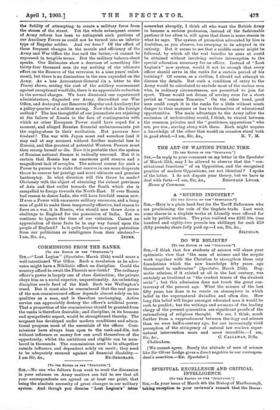SIR,—No one who follows from week to week the discussion
in your columns on Army matters can fail to see that all your correspondents are agreed on at least one point, that being the absolute necessity of great changes in our military system. And though you dismiss "Lost Legion's " letter somewhat abruptly, I think all who want the British Army to become a serious profession, instead of the fashionable pastime it too often is, will agree that there is some reason in what he says. The system of promotion advocated by him is doubtless, as you observe, too sweeping to be adopted in its entirety. But it seems to me that a middle course might be followed, by which all the real -benefits he aims at could be obtained without involving serious interruption to the special education necessary for an officer. Instead of "Lost Legion's" new system, would it not be enough that every officer should serve in the ranks for a certain period of his training ? Of course, as a civilian, I should not attempt to discuss the details. But such a condition of entry to the Army would be calculated to exclude most of the useless men who, in ordinary circumstances, are permitted to join for sport. These would not dream of serving even for a short Deriod as "common Tommies." On the other band, good men could rough it in the ranks for a little without mu& danger to their manners or loss to themselves of educational opportunities. The main advantage to the Army (after the exclusion of undesirables) would, I think, be shared between the common, privates and the "gentlemen apprentices" who are, pro tern., serving along with them. Each might acquire a knowledge of the other that would on occasion gaud both
in good stead.—I am, Sir, &c., R. V. M.






































 Previous page
Previous page